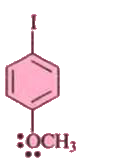Hydrolysis is a reaction in which the substance undergoes nucleophilic substitution with the solvent water. If the solvents are NH3 and ROH, then the corresponding terms are known as ammonolysis and alcoholysis respectively.
Q. Ammonolysis of SiCl4 followed by heating produces
Si(NH2)4
Si3N4
Si(OH)4
SiO2
The correct Answer is:B
Similar Questions
(i) Why are haloalkanes more reactive towards nucleophilic substitution reaction than haloarenes ?
(ii) Which one of the following two substance undergoes SN1 reaction faster and why ?

View SolutionAlkylation of aromatic compounds with aliphatic compounds like halides in presence of Lewis acid catalyst is known as Friedel-Crafts alkylation. It is an exapmle of electrophilic substitution.

In the process of acylation, R−O∣∣C− group is introduced to the ring. Compounds having (+ mesomeric groups) like −NH2 do not give Friedel-Crafts reaction because these compounds undergo conjugation with the catalyst. In the alkylation process, most branched alkyl group is substituted because isomerisation of carbonium ion takes place. In some Friedel-Crafts reactions, the nature of product changes with the solvent used in the reaction.
Predict whether the following statements are ture or false:
Carbocations undergo isomerisation in Frieded-Crafts reaction. In each of the following alkyl halides the isomerisation takes place:
CH3−CH2−CH2−Cl,
CH3−CH2−CH2−CH2−Cl
(a) True (b) False
View Solution
Knowledge Check
Hydrolysis is a reaction in which the substance undergoes nucleophilic substitution with the solvent water. If the solvents are NH3 and ROH, then the corresponding terms are known as ammonolysis and alcoholysis respectively.
Q. Alcoholysis of Al(CH3)3 by CH3OH gives rise toAAlH3BAl(OH)3CAl(OCH3)3+CH4DAl2O3.Hydrolysis is a reaction in which the substance undergoes nucleophilic substitution with the solvent water. If the solvents are NH3 and ROH, then the corresponding terms are known as ammonolysis and alcoholysis respectively.
Q. Which of the following compounds shows least tendency towards hydrolysis ?ABF3BBCl3CBBr3DBI3.Aliphatic nucleophilic substitution is mainly of two type SN1 and SN2.SN2 reaction proceed with strong nucleophile in polar aprotic solvent. 3∘ halides do not give SN2 reaction. Inverted products are obtained in this reaction and mechanism of reaction occurs through the formation of transition state.
SN1 reaction proceed through the formation of carbocation in polar aprotic solvent. Solvent itself acts as nucleophile in this reaction. Racemization takes place in SN1 reaction.
Which of the following compounds will give SN1 reaction?APh−CH3∣−∣ClCH2CH3BH3C−ClCH3C−CH2−BrD
Aliphatic nucleophilic substitution is mainly of two type SN1 and SN2.SN2 reaction proceed with strong nucleophile in polar aprotic solvent. 3∘ halides do not give SN2 reaction. Inverted products are obtained in this reaction and mechanism of reaction occurs through the formation of transition state.
SN1 reaction proceed through the formation of carbocation in polar aprotic solvent. Solvent itself acts as nucleophile in this reaction. Racemization takes place in SN1 reaction.
Which one of the following will give SN2 reaction ?
View SolutionAliphatic nucleophilic substitution is mainly of two type SN1 and SN2.SN2 reaction proceed with strong nucleophile in polar aprotic solvent. 3∘ halides do not give SN2 reaction. Inverted products are obtained in this reaction and mechanism of reaction occurs through the formation of transition state.
SN1 reaction proceed through the formation of carbocation in polar aprotic solvent. Solvent itself acts as nucleophile in this reaction. Racemization takes place in SN1 reaction.
Which one of the following will give racemised product in C2H5OH ?
View SolutionEvaporation is a method used to isolate a solid substance (solute) dissolved in a solution. On heating a solution in an open and broad container the solvent evaporates leaving behind the solute. This method is also used in obtaining salt from sea water.
Which of the following components is converted into vapours on heating?
View SolutionAliphatic nucleophilic substitution is mainly of two type SN1 and SN2.SN2 reaction proceed with strong nucleophile in polar aprotic solvent. 3∘ halides do not give SN2 reaction. Inverted products are obtained in this reaction and mechanism of reaction occurs through the formation of transition state.
SN1 reaction proceed through the formation of carbocation in polar aprotic solvent. Solvent itself acts as nucleophile in this reaction. Racemization takes place in SN1 reaction.
Which of the following compounds will give SN1 reaction ?
View SolutionAliphatic nucleophilic substitution is mainly of two type SN1 and SN2.SN2 reaction proceed with strong nucleophile in polar aprotic solvent. 3∘ halides do not give SN2 reaction. Inverted products are obtained in this reaction and mechanism of reaction occurs through the formation of transition state.
SN1 reaction proceed through the formation of carbocation in polar aprotic solvent. Solvent itself acts as nucleophile in this reaction. Racemization takes place in SN1 reaction.
Which one of the following will give SN2 reaction?
View Solution
